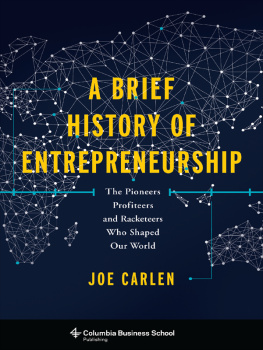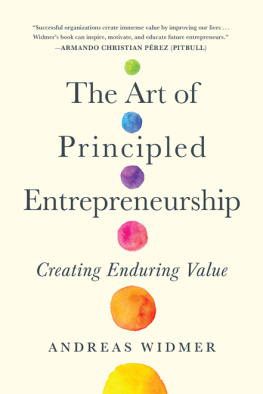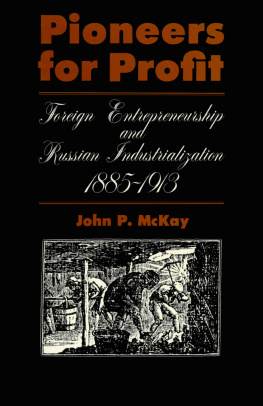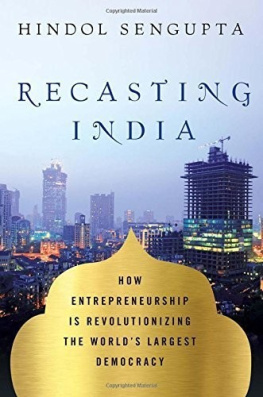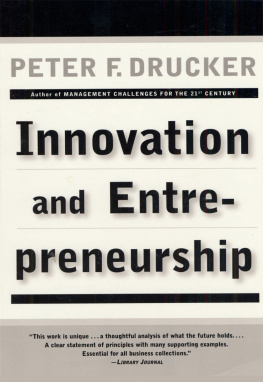Table of Contents
A BRIEF HISTORY OF ENTREPRENEURSHIP
A BRIEF HISTORY OF ENTREPRENEURSHIP
The Pioneers, Profiteers, and Racketeers Who Shaped Our World
JOE CARLEN
Columbia University Press
Publishers Since 1893
New York Chichester, West Sussex
cup.columbia.edu
Copyright 2016 Joe Carlen
All rights reserved
E-ISBN 978-0-231-54281-4
Library of Congress Cataloging-in-Publication Data
Names: Carlen, Joe, author.
Title: A brief history of entrepreneurship: the pioneers, profiteers, and racketeers who shaped our world / Joe Carlen.
Description: New York: Columbia University Press, [2016] | Series: Columbia Business School Publishing | Includes bibliographical references and index.
Identifiers: LCCN 2016014620 | ISBN 9780231173049 (cloth: alk. paper)
Subjects: LCSH: CommerceHistory. | EntrepreneurshipHistory. | BusinesspeopleHistory.
Classification: LCC HF352 .C37 2016 | DDC 338/.0409dc23
LC record available at https://lccn.loc.gov/2016014620
Cover design: Faceout Studio/Kara Davidson
Cover image: Shutterstock
A Columbia University Press E-book.
CUP would be pleased to hear about your reading experience with this e-book at .
CONTENTS
In 1985, Peter Drucker, the late management expert, defined entrepreneurship as the act that endows resources with a new capacity to create wealth, among the most specific and meaningful definitions of the term. More literally, the words entrepreneurship and enterprise both derive from the Old French word for an undertaking, entrependre. Yet even in French, the related word entrepreneur did not take on its current meaning until the economist Jean-Baptiste Say so imbued it in 1800.
In the English language, until the mid-nineteenth century, when the French term entrepreneur began to enjoy common usage outside France, the term undertaker (a literal translation of the French word) was sometimes used in its stead. More frequently, however, the more evocative term adventurer was preferred. In this vein, the American economist William Baumol once defined the entrepreneur as the individual willing to embark on adventure in pursuit of economic goals. These individuals and the often unintended impact of their adventures on the course of world history are the focus of this book.
Conducting research into this subject, I was particularly intrigued by such examples as Mesopotamian merchants creation of the urban market economy, Chinese tea traders ingenious invention of flying (i.e., paper) money, the central role of the entrepreneur in the onslaught of European colonization from the sixteenth through the nineteenth centuries, and the current flattening of the worlds economic playing fieldfrom Cameroon to Cambodiaa product of the modern entrepreneurs quest for cheaper labor and larger markets.
Throughout history, the entrepreneurs ceaseless quest to discover and/or develop new markets has been pursued through a variety of means, all of which have had an enormous impact on society. Among others, these methods have included overland and overseas trade, radical innovation of both products and processes, social engineering, territorial conquest, and most recently, interplanetary travel in the form of space tourism for the ultrarich. So while this book does not posit a moral argument for or against entrepreneurship, it does argue that it has been a prime mover, an instigator of seminal transformations that have altered the course of history.
Often, these transformations have extended beyond the realm of commerce. Some, such as Phoenician merchants colonization of the Mediterranean and the intercontinental Greek and Roman Empires that followed in Phoenicias wake, were primarily geopolitical. Others, like the impact of the British inventor-entrepreneurs behind the Industrial Revolution, were more sociological. Others still, such as Mesopotamian merchants invention of the shareholder-owned enterprise, developed further by Islamic civilization during the Middle Ages, or the commercialization of African American music, all generated an impact that extended across multiple facets of life.
It is also instructive to learn how entrepreneurship, often kindled by a streak of rebellion, interacted and even struggled with more entrenched aspects of society. Among other examples, this principle is illustrated by the array of entrepreneurial activities undertaken by slaves and recently freed men during the heyday of the Roman Empire and the impact of such enterprise on ancient Rome. Or, more recently, the increasingly Asian, Latin American, and African origins of many twenty-first-century entrepreneurs and their role in blurring, and in some instances even collapsing, the once stark contrasts between the developing and developed worlds. Indeed the spirit of entrepreneurship is often disruptive, even explosive.
Moreover, as entrepreneurs have helped spur momentous social, economic, technological, and other changes around them, the nature of entrepreneurship itself has been changing. Consequently, this book also discusses the evolving role of the entrepreneur throughout history. For example, as we see in the first chapter, in prehistoric and Mesopotamian times, almost all those seeking new markets were traders, while in the succeeding chapter about the Phoenicians, one learns of how entrepreneurial activities began to broaden into the production of finished goods and even a form of commercial colonization.
In the periods covered by subsequent chapters, entrepreneurs also became practitioners of purposeful innovation, cross-pollinators, and evangelizers. One also sees how, over time, these once distinct functions have coalesced into the multifaceted and multidisciplinary role of the modern entrepreneur. So in the process of learning about the history of entrepreneurship and its role in shaping our world, one also gains a deeper understanding of each of its vital components. It is a timely era in which to examine this phenomenon; in our interconnected twenty-first-century global economy, the promise, perils, and impact of entrepreneurship have never been more pronounced.
Heres an excerpt from a letter to the editor titled History Lesson, published in 2014 in Entrepreneur magazine: I was stunned to read your editorial in which you stated: It is only within the last 20 years that entrepreneurship has become the aspirational journey and holy grail ofinspired and fearless youth. I hope you meant the last 200 years. The railroads opened the West to thousands of entrepreneurs who made their fortunes with shops, restaurants and services they built. The central point of that letter is valid, but entrepreneurship reaches back much further than the writer realizes. In fact, the aspirational journey of the entrepreneur is neither twenty nor two hundred years old. Rather, it is a voyage that began at least twenty thousand years ago.
Primitive Barter
Evidence exists of barter, in various forms, and even small-scale trade of luxury items as far back as twenty to thirty thousand years ago, well into prehistoric times. During this era, known as the Upper Paleolithic period and the end of the Stone Age, human life was brief, transient, and mostly carnivorous. The primary social unit, the tribe, organized most of its activities around the principal objective of hunting game. This often involved extended treks following the seasonal migrations of the tribes prey. During this period, as the earth emerged from an ice age, some regions teemed with deer, mammoths, bison, and other game animals. The meat of these large mammals was the primary staple of the human diet.

